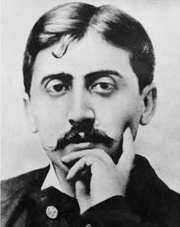Moncrieff: 603-615; Treharne: 436-445
by Dennis Abrams
A Guermantes who forged cheques, who cheated at cards “and was the most delightful of them all…” The rivalry between the Guermantes and the Courvoisiers. “Not only did the Courvoisiers not assign to intelligence the same importance as the Guermantes, they had a different notion of it.” The value the Guermantes placed on a sharp tongue, saying scathing things, and knowledge of painting, music, architecture and the English language. The distrust that the Courvoisiers placed on intelligence, seeing it as “a sort of burglar’s jemmy by means of which people one did not know from Adam forced the doors of the most reputable drawing-rooms,” and their knowledge of the price paid for having “those sort” of people in your house. But compared to the Guermantes, the Courvoisiers, “maintained in a certain sense the integrity of the titled class thanks at once to the narrowness of their minds and the malevolence of their hearts.” The unhappiness of the Courvoisiers when forced to mix with people they didn’t want to mix with. Mme de Villebon’s snubbing of the charming Comtesse G—” The art of keeping one’s distance, common to both the Guermantes and the Courvoisiers. The cold, searching gaze of the Guermantes before the handshake, the “haughty stiffness or hurried negligence” of the Courvoisiers. The affability of a letter from the Guermantes, lodged between a cold salutation and sign-off. The different styles of sub-groups among the Guermantes. The dislike of the Courvoisiers of the Duchesse de Guermantes. Their jealousy of her ability to marry well. The lack of public style of the Courvoisiers as compared to the Guermantes. “Whereas Saint-Loup who was up to the eyes in debt, dazzled Doncieres with his carriage-horses, a Courvoisier who was extremely rich always went by tram. Similarly (though of course many years earlier), Mlle de Guermantes (Oriane) who had scarcely a penny to her name, created more stir than all the Courvoisiers put together.” “She had the audacity to say to the Russian Grand Duke: ‘Well sir, it appears you would like to have Tolstoy assassinated.'” The disdain of the Dowager Duchesse de Gallardon, who, not having had a visit from Mme de Guermantes in years, explained that it was because “It seems she recites Aristotle,” (meaning Aristophanes) “in society. I won’t tolerate that sort of thing in my house!” The delight of the Guermantes in Oriane’s wit. Because of the Guermantes general affability, “there entered into the substance of stylish manners, hitherto rather hollow and dry, everything that one would naturally have liked and had force oneself to eschew, a genuine welcome, the warmth of true friendliness, spontaneity.”
—-
Got to admit — loved this section. Proust’s analysis of the differences (and similarities) between the Guermantes and the Courvoisiers, the reasons why the Courvoisiers dislike Oriane and why the Guermantes embraced her was wonderfully done.
—-
I recently read this in Clive James’ Cultural Amnesia, and thought you might enjoy it.
“In Proust, there are few figures that the narrator finds lasting cause to trust, but Elstier, the veteran and venerable painter, is one of them. the sage, said Elstir, must forgive himself his past faults. Elstir forgot to add that the sage should also correct them. Proust says it for him elsewhere: those we like least are those most like us, but with the faults uncured. It is always dangerous to say ‘This is what we read Proust for.’ There are people who read Proust just for the clothes. But those of us who read Proust for his remarks about life will always be wondering whether A la recherche du temps perdu is really a work of art at all. A work of imagination: yes, of course, and supremely. But is it a novel? Isn’t it a book of collected critical essays, with the occasional fictional character wandering in and out of it? After the composer Busoni read Du cote de chez Swann, he complained to Rilke that although he had quite enjoyed the opinions about music, he thought the rest of the book was a bit like a novel. Isn’t it a work of encyclopedic synthesis? Thomas Mann, in his diaries, took notes on the way that Proust had taken notes. He especailly praised the detail of Proust’s interest in flying beetles. Isn’t it a work of philosophy? Jean-Francoise Revel, in his brief book Sur Proust — the commentary on Proust that almost gives you the courage to do without all the others — is clearly fascinated with the possibility that Proust might have restored philosophy to its position of wisdom. Often, in the long shelf of his writings, Revel argues that philosophy, having ceased in the eighteenth century to be queen of the sciences, has, in modern times, no other role except to be wise. In Sur Proust he casts his author as a character in a drama: the drama of philosophy reborn. Revel calls A la recherche one of the rare books that even in their weaknesses offer an example of ‘totally adult thought.'”
—
What’s your opinion? Is it a novel? A collection of essays? An encylopedia? A work of philosophy? Or is it, and it is in this, I think, that is one of the many reasons for its greatness, all of the above?
—
The Weekend’s Reading:
Moncrieff: Page 615 “Authentic or not, Mlle de Guermantes’s apostrophe to the Grand Duke…” through Page 644 “…and at a pinch that the true Phedre is that of Pradon.”
Treharne: Page 445 “Whether it was authentic or not, Mlle de Guermantes’s heckling remark to the Grand Duke…” through Page 466 “…and at a pinch that the true Phedre is the one by Pradon.”
Enjoy. And enjoy your weekend.


